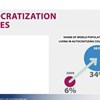declares
No declines in mental health among young adults at the beginning of the pandemic
When restrictions were introduced at the beginning of the pandemic, many assumed that young adults' mental health would deteriorate rapidly due to factors such as social isolation, unemployment and ec
AI4People or People4AI? On human adaptation to AI at work
Ai & Society. Curmudgeon paper Abstract There is a disturbing discrepancy between the AI ethics frameworks that highlight the technology’s ability to promote the social good and the relationship bet
Thomas Sterner: Is there a climate crisis?
Thomas Sterner, Professor of Environmental Economics, Dept of Economics, University of Gothenburg The Guardian recently decided to change house style and start using terms like Climate Crisis instead o
Sofia Jeppsson: Philosophy of Madness and lived experience
Venue: Institute for Futures Studies, Holländargatan 13 in Stockholm or online Research seminar with Sofia Jeppson, Associate Professor of philosophy at Umeå University. She started her career writing m
Life-style and self-rated global health in Sweden: A prospective analysis spanning three decades
Preventive Medicine ScienceDirect http://www.sciencedirect.com/science/article/pii/S0091743513003472 Abstract The article studies the relation between lifestyle and global self-rated health in the adult
Two Decades of Same-Sex Marriage in Sweden: A Demographic Account of Developments in Marriage, Childbearing, and Divorce
Demography 57, 147-169 Abstract In this study, we provide demographic insight into the still relatively new family form of same-sex marriage. We focus on period trends in same-sex marriage formation and
Has the Youth Labour Market Deteriorated in Recent Decades? Evidence from Developed Countries?
This paper investigates the evidence concerning trends in youth relative pay and employment in developed economies since the mid-1970s, focusing on structural change on the demand-side of the labour m

Anna Lührmann: Walking the Talk. Which Parties Threaten Democracy?
The recent increase of democratic declines around the world has sparked a new generation of studies on the topic. Scholars agree that these days the main threat to democracy arises from democratically
Changes in young adults' mental well-being before and during the early stage of the COVID-10 pandemic: disparities between ethnic groups in Germany
Child and Adolescent Psychiatry and Mental Health 15:69 (2021) Abstract The COVID-19 pandemic resulted in substantial disruptions to the daily lives of young people. Yet knowledge is lacking about change = 25). Respondents provided information on mental well-being (psychosomatic complaints, anxiety, depression, life satisfaction) and exposure to pandemic-related stressors (financial worries, health worries, discrimination, contact with COVID-19). Responses on mental well-being were matched to responses from two pre-pandemic waves.
Persistent boundaries. Partnership patterns among children of immigrants and natives in Sweden
Journal of Ethnic and Migration Studies Abstract Integration theories assume that ingroup partnering (endogamy) among individuals of immigrant background declines as their exposure to majority society i








